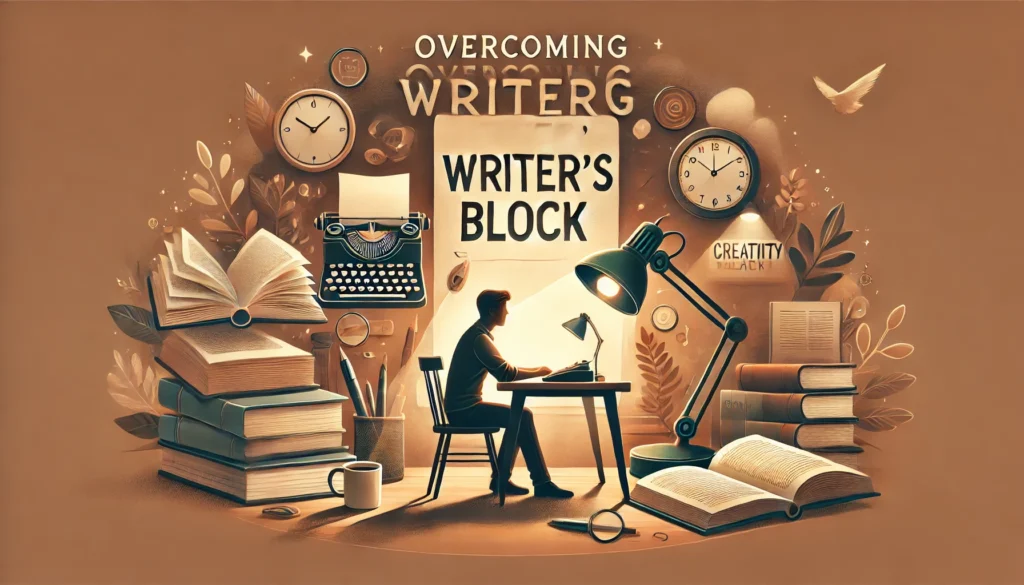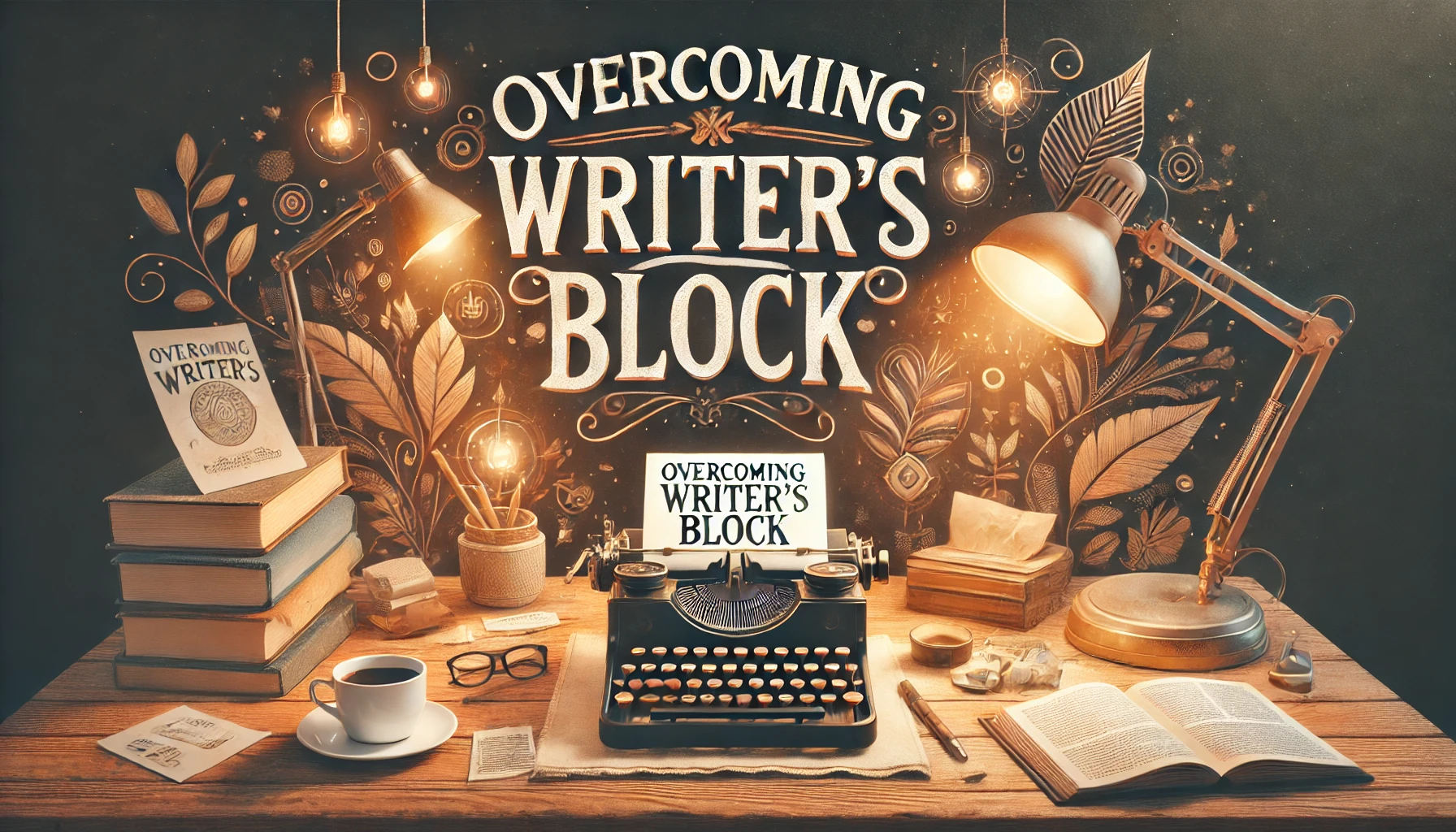We’ve all been there. You sit down to write, full of ideas and enthusiasm, but the words just won’t come. Instead, you’re staring at a blank page, feeling frustrated and stuck. This struggle has a name: Overcome Writer Block. It’s one of the most common challenges for writers, whether you’re a student working on an essay, a blogger crafting content, or an author writing your next masterpiece.

Overcoming writer’s block is not just about finding words; it’s about rekindling your creativity and confidence. The good news? It’s entirely possible to beat it. This blog will guide you through practical tips and strategies to overcome writer’s block and get your creativity flowing again.
Table of Contents
What Is Writer’s Block?
Before diving into solutions, let’s understand what writer’s block really is. Writer’s block is a condition where a writer struggles to produce new work or feels a lack of inspiration. It can happen to anyone, regardless of experience or skill level. Sometimes, it lasts for hours; other times, it lingers for weeks or even months.
But here’s the thing: writer’s block doesn’t mean you’re a bad writer. It’s just a temporary hurdle, and overcoming writer’s block is about learning how to navigate this creative roadblock.
Common Causes of Writer’s Block
- Perfectionism: Feeling like your writing has to be flawless from the start can paralyze you.
- Fear of Failure: Worrying about how others will judge your work can stop you from even starting.
- Lack of Ideas: Sometimes, it feels like your mind is completely empty.
- Burnout: Overworking yourself can drain your creativity and energy.
- Distractions: Noise, social media, or personal issues can pull your focus away.
Identifying the root cause of your writer’s block is the first step to overcoming it.
Practical Tips for Overcoming Writer’s Block
1. Start with Freewriting
One of the simplest ways to overcome writer’s block is to start freewriting. Set a timer for 10-15 minutes and write whatever comes to your mind without worrying about grammar, structure, or logic. This exercise helps clear your mind and often leads to new ideas.
2. Break It Down
Feeling overwhelmed by a big project? Break it into smaller tasks. For example, if you’re writing a blog post, focus on creating an outline first. Then work on one section at a time. Taking small steps makes the process less intimidating and helps you overcome writer’s block more easily.
3. Change Your Environment
Sometimes, a change of scenery can do wonders for your creativity. If you’ve been writing at your desk, try moving to a coffee shop, a park, or even another room in your house. A fresh environment can inspire new ideas and help you overcome writer’s block.
4. Set Realistic Goals
Instead of aiming to write an entire chapter or blog post in one sitting, set smaller, achievable goals. For example, commit to writing 200 words or completing one paragraph. Meeting these goals builds momentum and helps you overcome writer’s block step by step.
5. Read for Inspiration
Reading books, articles, or essays related to your topic can spark new ideas. Sometimes, seeing how other writers approach similar subjects can reignite your creativity and help you overcome writer’s block.
6. Take Breaks
If you’ve been staring at a blank screen for hours, it’s time to step away. Go for a walk, listen to music, or do something you enjoy. Giving your mind a break often brings clarity and fresh ideas.
7. Eliminate Distractions
Turn off your phone, close unnecessary tabs on your computer, and create a distraction-free zone. Focusing entirely on your writing can make overcoming writer’s block much easier.
8. Try Writing Prompts
When you don’t know what to write, use prompts to kickstart your creativity. Prompts can be as simple as “Write about your happiest memory” or “What would you do if you could time travel?” These exercises can help you overcome writer’s block by giving you a starting point.
9. Embrace Imperfection
Remember, your first draft doesn’t have to be perfect. Focus on getting your ideas down on paper and worry about editing later. Overcoming writer’s block often means letting go of perfectionism.
10. Set a Routine
Creating a consistent writing schedule can help you overcome writer’s block. When you write at the same time every day, it becomes a habit, and your brain starts to associate that time with creativity.
Motivational Strategies for Overcoming Writer’s Block
1. Remind Yourself Why You Write
Think about why you started writing in the first place. Was it to express yourself, share knowledge, or tell stories? Reconnecting with your purpose can help you overcome writer’s block.
2. Celebrate Small Wins
Every word you write is a step forward. Celebrate your progress, no matter how small. This positive reinforcement can motivate you to keep going.
3. Visualize Success
Picture yourself completing your project and feeling proud of your work. This mental exercise can boost your confidence and make overcoming writer’s block feel achievable.
4. Surround Yourself with Supportive People
Talk to friends, join a writing group, or connect with other writers online. Sharing your struggles and getting encouragement can help you overcome writer’s block.
Tools and Resources to Help You Overcome Writer’s Block
- Writing Software: Tools like Scrivener, Google Docs, or Notion can make organizing your ideas easier.
- Mind Mapping: Apps like MindMeister or pen and paper can help you brainstorm and structure your thoughts.
- Meditation Apps: Apps like Headspace or Calm can help reduce stress and clear your mind.
- Books on Writing: Reading books like On Writing by Stephen King or Bird by Bird by Anne Lamott can offer practical advice and inspiration.
Conclusion
Overcoming writer’s block might seem daunting, but it’s completely possible with the right approach. Remember, writer’s block is not a reflection of your abilities or talent. It’s just a temporary challenge that every writer faces.
By practicing techniques like freewriting, breaking tasks into smaller steps, and embracing imperfection, you can overcome writer’s block and rediscover the joy of writing. Stay patient with yourself, and don’t give up. The words will come.
FAQ
What is the main cause of writer’s block?
Writer’s block can be caused by factors like perfectionism, stress, self-doubt, or lack of direction.
How can I overcome writer’s block quickly?
Try freewriting, changing your environment, or taking a short break to recharge your creativity.
Are there tools to help with writer’s block?
Yes, tools like writing prompts, brainstorming apps, and noise-canceling headphones can be helpful.
How long does writer’s block last?
The duration varies from person to person. With the right strategies, you can overcome it quickly.
Can writer’s block affect professionals?
Absolutely. Even seasoned writers and professionals experience writer’s block from time to time.



